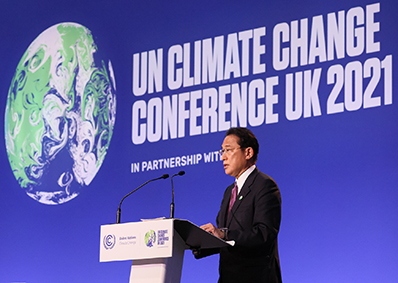ODA Topics 4
Japan’s Efforts and Support for Developing Countries to Achieve Net-Zero by 2050

Prime Minister Kishida delivering a speech at the COP26 World Leaders Summit (Photo: Cabinet Public Affairs Office of the Government of Japan)

“The COP26 Globe at the Hydro,” at the COP26 venue (Photo: Karwai Tang/UK Government)
Climate change is an issue that requires immediate actions on a global scale. In October 2020, Japan declared its aim to realize a decarbonized-society by reducing greenhouse gas emissions to net-zero by 2050, and is promoting initiatives for this.
In the meeting of the Global Warming Prevention Headquarters in April 2021, Japan announced that it aims to reduce greenhouse gas emissions by 46% in FY2030 from FY2013 levels, setting an ambitious target that is aligned with the long-term goal of achieving net-zero by 2050, and that it will continue strenuous efforts in its challenge to meet the lofty goal of cutting emissions by 50%. This goal means to raise the previous target by over 70%. Japan also announced this goal to the world at the Leaders Summit on Climate hosted by the United States in April 2021 and the announcement was welcomed by other nations, including the United States.
Japan advanced its efforts to substantiate measures to achieve net-zero by 2050 and the FY2030 target. In October 2021, Japan formulated the new Plan for Global Warming Countermeasures and the Strategic Energy Plan. It also submitted Japan’s National Determined Contribution (NDC)*1 which reflects the new reduction goals, and Japan’s Long‐Term Strategy under the Paris Agreement, which sets out initiatives to realize net-zero by 2050, to the Secretariat of the United Nations Framework Convention on Climate Change.
Japan has also accelerated collaboration and cooperation with other countries. At the Japan-U.S. Summit Meeting on April 16, 2021, the Japan-U.S. Climate Partnership was launched, with which both countries confirmed to promote initiatives under the following three pillars: (i) Cooperation and dialogue on climate ambition and implementation of the Paris Agreement, (ii) Climate and clean energy technology and innovation, and (iii) Cooperation on accelerating the transition to a decarbonized society in third countries, particularly in the Indo-Pacific. In addition, at the Japan-EU Summit on May 27, Japan and the EU launched the Japan-EU Green Alliance, a cooperative framework for the climate and environmental fields that includes the promotion of cooperation to support developing countries to transition to climate-neutral and climate-resilient societies.
At the G7 Cornwall Summit in June, Japan announced that it would provide assistance that amounts to ¥6.5 trillion over the next five years from 2021 to 2025, both in public and private, and that it would enhance assistance in adaptation*2 for countries that are vulnerable to the effects of climate change. In addition, in the Summit Communique, the G7 committed to an end to new direct government support for unabated international thermal coal power generation by the end of 2021.
On top of this, at the 26th Session of the Conference of the Parties to the United Nations Framework Convention on Climate Change (COP26), held from October to November 2021, Prime Minister Kishida stated his determination that Japan would be working in full force to take on climate change, a common challenge of humankind. In addition, in order to lead the initiative in fulfilling the goal of climate finance*3 that developed countries are collectively committed to the $100 billion per year to assist developing countries’ efforts, he announced the four new commitments below.
(i) Developing leading projects worth $100 million to transform fossil-fuel-fired thermal power into zero-emission thermal power that uses ammonia, hydrogen and other fuels, mainly in Asia, through the Asia Energy Transition Initiative, maximizing the introduction of renewable energy.
(ii) Providing up to $10 billion in the coming five years, which would include the contribution to the launch of Innovative Financial Facility for Climate as Japan partners with the Asian Development Bank and others to support the decarbonization of Asia and beyond, in addition to the contribution announced at the G7 Cornwall Summit in June 2021, in order to lead the initiative in fulfilling the financial goal of climate finance that developed countries are collectively committed to the $100 billion per year.
(iii) Doubling Japan’s assistance for adaptation to climate change to approximately $14.8 billion, both in public and private finance, in the five years to 2025.
(iv) Providing financial assistance worth approximately $240 million, in both public and private finance, for the forest sector in the five years to 2025.
Japan will steadfastly implement its commitments in the international community and continue to contribute proactively to climate change measures both through its own initiatives and the support for the efforts of developing countries.
*1 See Note 64.
*2 See Note 65.
*3 At COP15 in 2009, developed countries agreed to collectively provide support worth $100 billion per year, both in public and private finance, to developing countries up to 2020. Then, at COP21 held in 2015, developed countries agreed to keep this commitment through to 2025.
